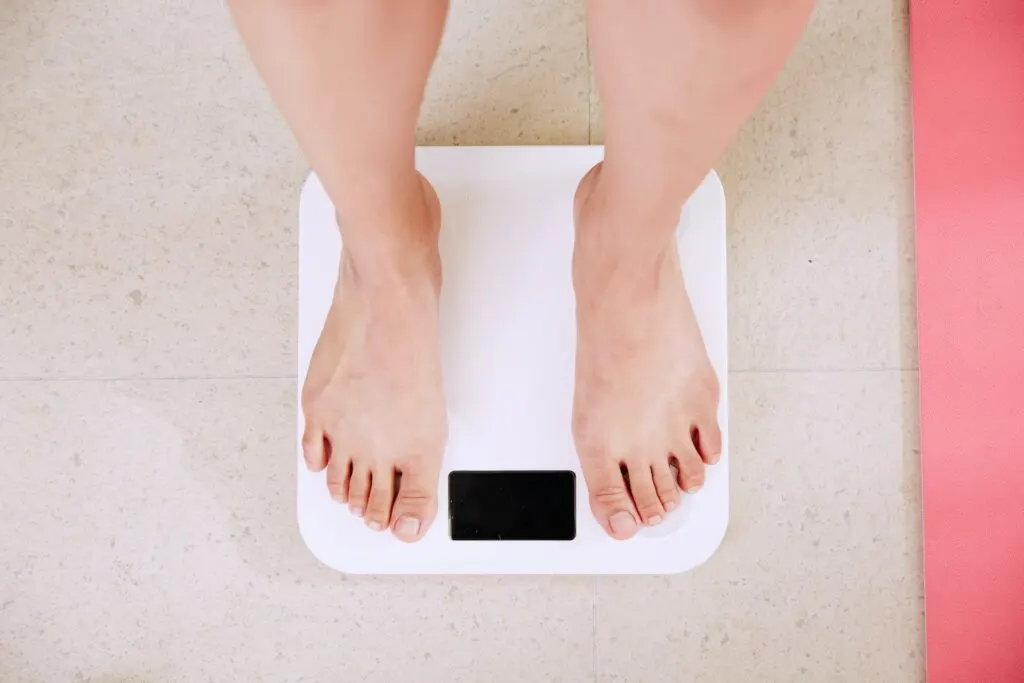This post may contain affiliate links. I only recommend products I use and love. Read the full disclosure here
Last Updated on April 6, 2023 by Alaina
Searching for an effective and healthy way to lose weight? The pursuit of a thinner waistline can be dangerous if not done properly. That’s why our guide will provide you with some advice on how to lose weight in a healthy way so you can safely shed pounds without sacrificing your health.
From tracking calories and portion control to exercise modifications and mindful eating, learn how you can successfully reach your weight loss goals in a sustainable way.

Create a weight loss plan tailored to your lifestyle and goals
To get started with your weight loss plans, it’s crucial to assess the amount of time you have available on a regular basis for physical activity and meal planning. This will help you determine what kind of exercises and diet changes work best for your situation.
Beyond that, it can be helpful to set weekly or monthly goals — this way you can track some measurable successes in addition to how you feel overall. Ultimately, the goal is to create a healthy weight loss plan tailored to your wellness needs and life schedule; with consistency and dedication, you will be able to reach the results you desire.
Reduce processed foods from your diet
By reducing the number of processed foods in your diet, you can start to see improvements in not only your waistline but also your energy levels.
Not to mention, it is a great opportunity to incorporate some healthier options into what you usually eat throughout the week. While implementing your meal plan for weight loss, smoothies, fresh fruits and vegetables, and lean proteins can provide the necessary nutrients and benefits, including improved digestion and better nutrient absorption. You may also find that swapping out processed food with whole grain options helps keep you full longer and leads to an overall lower calorie intake.
So, start experimenting with different recipes or meals that are low in sodium, fat, and added sugars — your body will thank you!
Track your progress
Keeping a food journal and logging your workouts can be a great way of tracking your progress on your journey to lose weight in a healthy way. Your food journal should focus on easy-to-track information like servings and calories so that you don’t become overwhelmed. If you are more tech-savvy, there are plenty of websites and apps that can log this information for you, making the process effortless.
Similarly, logging your workouts is just as important, if not more. This means noting down all exercises you did in the session along with the duration of each specific exercise and how much weight you lifted.
All this information helps you realize how far you have come and any errors made in the past that can be amended going forward.
Increase protein intake
Protein is an essential nutrient for our bodies to sustain a healthy diet. Increasing your protein intake can help reduce those pesky hunger cravings that pop up throughout the day.
Most foods are either high in fat, sugar, or carbohydrates which don’t always provide the full spectrum of nutrients we need. To counteract this, incorporating more protein in a meal or snack will keep you feeling fuller and provide sustained energy by breaking down more slowly in the body. There are plenty of delicious meals and snacks that can provide a good source of protein like eggs, nuts, beans, meat, and dairy.
Incorporate resistance training into your exercise routine
Resistance training can be an incredibly powerful way to improve your overall health and fitness. Incorporating them into your regular routine builds strength increases muscle mass, raises your metabolism, and reduces stress. Popular types of resistance training include bodyweight exercises like push-ups and pull-ups, weight lifting, plyometrics (jumping), kettlebells, and yoga.
No matter what type of exercise you choose, remember that it’s important to tailor the intensity of your workout to the goals you want to achieve. Doing this correctly will greatly improve body composition, posture, balance, and flexibility as well as increase strength and lose weight. In addition, it may help strengthen the immune system due to the release of endorphins that occurs when you exercise.

Take time for self-care
Supporting our mental and physical health is essential to managing stress. Many studies have found that taking time for self-care, such as exercise or getting adequate sleep, can actually help us lose weight in a healthy way.
Also, being kind to ourselves with positive self-talk and engaging in activities that bring joy can offer an antidote to the daily stress that we face. To maintain physical and mental well-being it is necessary to make time for ourselves, even when it feels difficult. When we prioritize self-care activities in our lives, we will feel healthier and better equipped to take on the world!
Never skip breakfast
Breakfast is a meal that should never be skipped, as it is essential for overall health. Eating breakfast provides energy for the remainder of the day — without it, a person can experience mental and physical fatigue.
Research has shown that eating breakfast improves brain function and helps with alertness, memory recall, and other cognitive skills. Moreover, making a habit of eating breakfast regularly has been associated with improved energy intake balance and could also potentially aid in weight management. People who consume breakfast every day tend to have lower BMIs than those who skip this important meal.
Read food labels
Knowing what ingredients are in the food we eat is important for maintaining a healthy lifestyle and if you want to lose weight in a healthy way. Many of us pick up food without reading the labels, however, this could have detrimental effects if ingredients like salt and sugar have been added.
Reading and understanding food labels can help us make more informed decisions about what is best for our health; not just in terms of nutrition but also in identifying potential allergens. So next time you’re out grocery shopping, take a few minutes to read the back of those packets.
Eat on a smaller plate
Using a smaller plate can be beneficial for portion control and healthy eating habits. They give the impression of being full more quickly, leading to less overeating. You also tend to make better nutrition choices since it fits fewer calories on them.
Avoid drinking alcohol
Regularly drinking alcohol can have serious repercussions on health and well-being, especially if done in excess. When it comes to weight loss, for example, alcohol consumption can greatly hinder progress. This is because it contains calories that are not necessarily ‘bad’ but also provide no nutritional value.
Furthermore, it tends to cause higher calorie intake as any foods eaten during intoxication are usually unhealthy choices. Cutting down on alcohol or eliminating it from your life entirely is a wise choice if you wish to maintain or lose weight in a healthy way.
Taking small, manageable steps like reducing processed foods, increasing protein intake, and avoiding alcohol can really help ensure success.
These simple tips are easy to apply to everyday life and with dedication and consistency you’ll be well on the path to reaching your weight loss goals —good luck!
